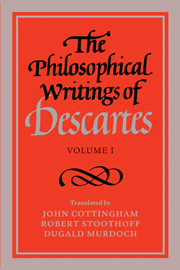Book contents
- Frontmatter
- Contents
- General introduction
- Chronological table of Descartes' life and works
- Early Writings
- Rules for the Direction of the Mind
- The World and Treatise on Man
- Discourse and Essays
- Principles of Philosophy
- Comments on a Certain Broadsheet
- Description of the Human Body
- The Passions of the Soul
- Index
Comments on a Certain Broadsheet
Published online by Cambridge University Press: 05 June 2012
- Frontmatter
- Contents
- General introduction
- Chronological table of Descartes' life and works
- Early Writings
- Rules for the Direction of the Mind
- The World and Treatise on Man
- Discourse and Essays
- Principles of Philosophy
- Comments on a Certain Broadsheet
- Description of the Human Body
- The Passions of the Soul
- Index
Summary
Translator's preface
Descartes' Comments on a Certain Broadsheet (Notae in Programma quoddam) was written in Latin and published by the house of Elzevir at Amsterdam early in 1648. The work was Descartes' response to a broadsheet published anonymously by Henri de Roy (Henricus Regius, 1598–1679) towards the end of 1647. Regius was Professor of Medicine at the University of Utrecht, and an enthusiastic supporter of Descartes' physics. His teaching of Descartes' doctrines was vigorously opposed by the Rector of the University, Gisbert Voet (Voetius), who attempted to have Regius removed from his Chair.
For several years Regius enjoyed an amicable pupil-master relationship with Descartes, who apparently had a high regard for his intellect. The friendship between the two men, however, deteriorated after the publication of Regius' Foundations of Physics in 1646. The first half of Regius' work deals with physics, along lines very similar to those of Descartes' Principles of Philosophy (1644); the second half, which deals with physiology, among other biological subjects, anticipates many of Descartes' as yet unpublished ideas, to which Regius had access through personal notes. Descartes complained that Regius had not only borrowed many of his ideas, but had also seriously distorted them. Regius, moreover, disagreed not only with much of Descartes' metaphysics, but also with Descartes' thesis that physics requires rationally grounded metaphysical foundations. Descartes dissociated himself from Regius in his prefatory letter to the translator of the French edition of the Principles of Philosophy (1647).
Information
- Type
- Chapter
- Information
- The Philosophical Writings of Descartes , pp. 293 - 312Publisher: Cambridge University PressPrint publication year: 1985
Accessibility standard: Unknown
Why this information is here
This section outlines the accessibility features of this content - including support for screen readers, full keyboard navigation and high-contrast display options. This may not be relevant for you.Accessibility Information
- 2
- Cited by
